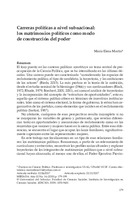Carreras políticas a nivel subnacional : los matrimonios políticos como modo de construcción del poder
Abstract
El foco puesto en las carreras políticas constituye un tema central de preocupación de la Ciencia Política, que se ha intensificado en las últimas décadas. Una carrera puede ser caracterizada “considerando los espacios de reclutamiento político, el tipo de candidato, la trayectoria, y las ambiciones de los actores” (Bieda, 2015). La más profusa es la teoría de la ambición, desde el estudio seminal de Schlessinger (1966) y sus continuadores (Black, 1972; Rhode, 1979; Borchert, 2001, 2011), así como el análisis de trayectorias y la incorporación del concepto de “estructura de oportunidades”, esto es, aquello que el sistema político ofrece en términos de incentivos institucionales, tales como el sistema electoral, la forma de gobierno, la estructura organizativa de los partidos, como elementos que inciden en el reclutamiento político (Sartori, 1987). No obstante, cualquiera de esas perspectivas resulta incompleta si no se incorporan las variables de género y patriarcado, que revelan diferencias tanto en oportunidades y mecanismos de reclutamiento como en los recorridos que varones y mujeres hacen en la arena política. Entre esas diferencias, se encuentra el lugar que ocupan los lazos familiares, significativamente superiores entre las representantes mujeres. En este trabajo nos focalizaremos en un tipo de esas relaciones familiares: los matrimonios políticos. Buscaremos, a partir de un relevamiento de currículums y entrevistas, reconstruir los perfiles socioculturales y explorar trayectorias de los integrantes de matrimonios políticos que a nivel subnacional hayan alcanzado, al menos uno de ellos, el Poder Ejecutivo Provincial. Nuestro eje temporal será el período 1983-2015. Aportaremos evidencias de cómo las relaciones familiares constituyen un factor importante en la construcción de espacios de poder y exploraremos las razones por las cuales se erigen en una estructura de oportunidades particularmente relevante para las mujeres, enlazando la discusión en el marco del debate sobre la representación política y la teoría de la democracia. The focus on political careers is a central concern of political science, which has been intensified in recent decades. A political career can be characterized “considering the political recruitment mechanisms, the type of candidate, the trajectory, and the ambitions of the actors” (Bieda, 2015, p. 6). The most profuse is the ambition theory, from Schlessinger’s seminal study (1966) and his followers (Black, 1972; Rhode, 1979; Borchert, 2001, 2011) as well as the analysis of trajectories and the incorporation of the concept of “structure of opportunities”, this is what the political system offers in terms of institutional incentives, such as the electoral system, the form of government, parties organizational structure, as elements that influence political recruitment (Sartori, 1987). However, any of these perspectives is incomplete if variables as gender and patriarchy are not incorporated. They reveal differences in recruitment mechanisms and opportunities, as well as in men and women’ paths in the political arena. Among these differences lie the place of family ties, which are significantly higher among women representatives. In this paper, we will focus on one type of family relationships, which are the “political marriages” that have the condition that at least one of them have reached the Provincial Executive Power at a subnational level, taking as the temporary axis the period 1983-2015. We will seek through the review of the resumes and interviews reconstruct socio-cultural profiles, and will explore the political paths these members of the political marriages have gone through. We will provide evidence of how family relationships are an important factor in power building and explore the reasons why they are developed on a structure of opportunity that is particularly relevant for women, linking the discussion within the framework of the debate on political representation and the theory of democracy.
Collections
The following license files are associated with this item:




